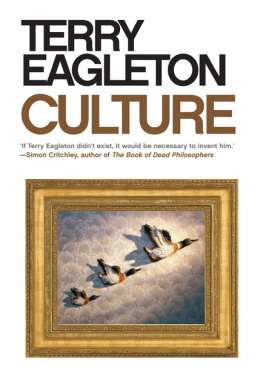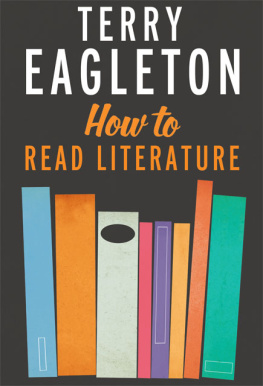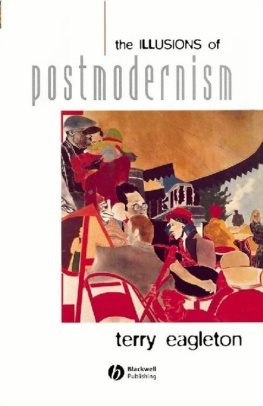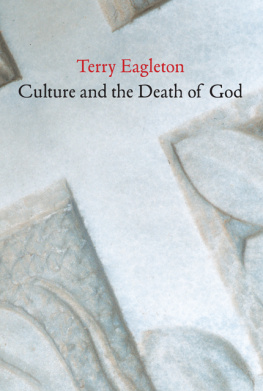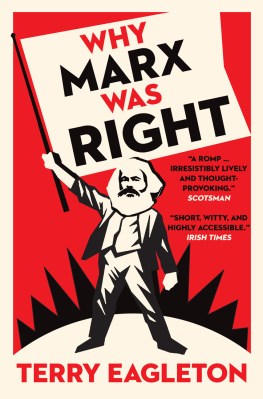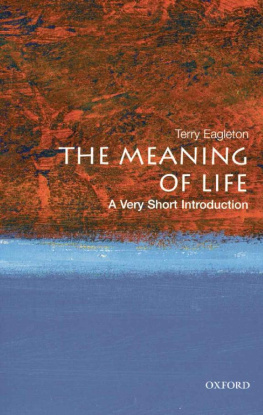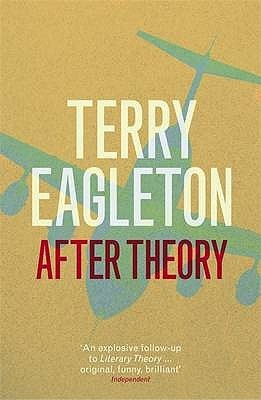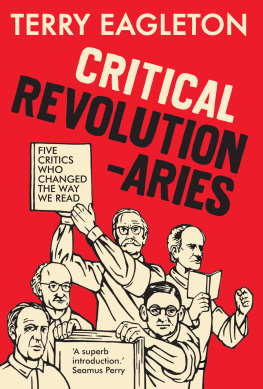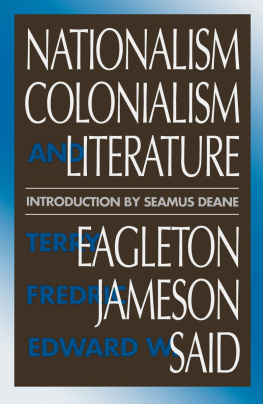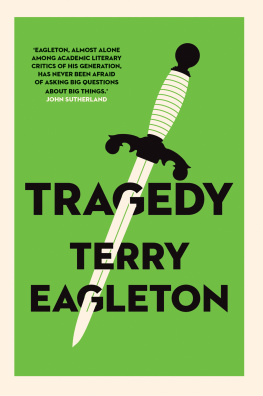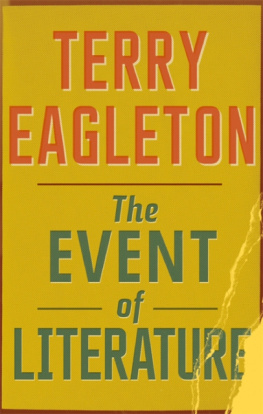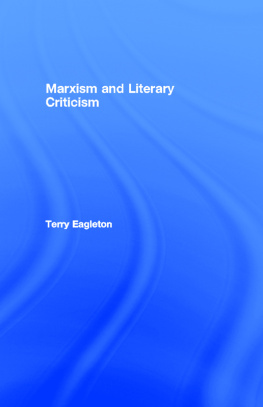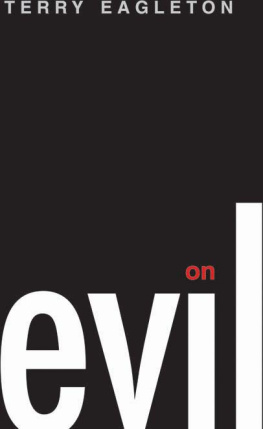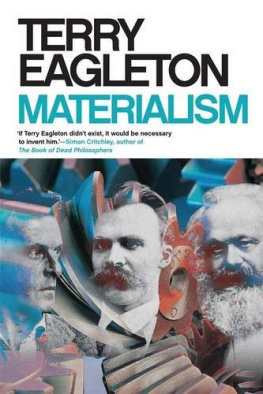

Copyright 2016 Yale University Press
All rights reserved. This book may not be reproduced in whole or in part, in any form (beyond that copying permitted by Sections 107 and 108 of the U.S. Copyright Law and except by reviewers for the public press) without written permission from the publishers.
For information about this and other Yale University Press publications, please contact:
U.S. Office:
Europe Office:
Typeset in Adobe Garamond Pro by IDSUK (DataConnection) Ltd
Printed in Great Britain by TJ International Ltd, Padstow, Cornwall
Library of Congress Cataloging-in-publication Data
Eagleton, Terry, 1943
Culture / Terry Eagleton.
New Haven, CT : Yale University, 2016. | Includes bibliographical references and index.
LCCN 2015037500 | ISBN 9780300218794 (alk. paper)
Culture. | Civilization, Modern.
HM621. E154 2016 | DDC 306dc23
LC record available at http://lccn.loc.gov/2015037500
A catalogue record for this book is available from the British Library.
10 9 8 7 6 5 4 3 2 1
For Tony Adami
Contents
Preface
C ULTURE IS A MULTIFACETED concept, which makes it hard to run a tightly unified case about it. This book accordingly sacrifices any strict unity of argument in order to approach its subject from a number of different perspectives. I begin by examining various senses of the term culture, and go on to explore some key differences between the idea of culture and the notion of civilisation. I then go on to examine the postmodern doctrine of culturalism, for which culture is fundamental to human existence, and in doing so submit the concepts of diversity, plurality, hybridity and inclusivity to some unfashionable criticism. I also take issue with the tenets of cultural relativism.
Culture can be seen as a kind of social unconscious, and with this idea in mind I look at the work of two major exponents of it: the political philosopher Edmund Burke, an author whose writings are widely known but who is not commonly associated with the idea of culture; and the German philosopher Johann Gottfried Herder, whose extraordinarily original thinking on cultural questions is not as much in vogue as it should be. I also have some comments on culture as the social unconscious in the work of T.S. Eliot and Raymond Williams two thinkers for whom culture is an utterly vital concept, but from sharply opposed political standpoints.
A chapter on Oscar Wilde pays homage to this most audacious and agreeable of cultural critics, while also summarising some of the versions of culture examined so far. I then turn to the question of why the idea of culture has bulked so large in what is often seen as a philistine modern age, and set out a range of reasons for this. Chief among them are the idea of culture as an aesthetic or utopian critique of industrial capitalism; the rise of revolutionary nationalism, multiculturalism and identity politics; the search for a substitute for religion; and the emergence of the so-called culture industry. I also take a critical look at the doctrine of culturalism, for which culture goes all the way down in human existence, as well as at the question of cultural relativism. A Conclusion lays out a number of reasons for deciding that culture is by no means as central to modern societies as some of its apologists would imagine.
Perspicacious readers will note that there is an Irish motif running throughout the book, from Swift, Burke and Wilde to Irish anti-colonial politics.
T.E.
CHAPTER ONE
Culture and Civilisation
C ULTURE IS AN exceptionally complex word the second or third most complex word in the English language, so it has been claimedsome other northerly nations. You can, however, visit Santa Claus at his home on the Arctic Circle the whole year round in Lapland, a treat which probably cant be found anywhere else on the planet.
Culture in the artistic and intellectual sense of the word may well involve innovation, whereas culture as a way of life is generally a question of habit. You can compose a new concerto or publish a new journal, but when it comes to culture in the broader sense of the word, the idea of a new cultural event has a mildly self-contradictory ring to it, though such things do of course exist. Culture in this sense is what you have done before even, perhaps, what your ancestors have done millions of times over. For your own conduct to be valid, it may need to be in line with theirs. Culture in the sense of art can be avant-garde, while culture as a way of life is mostly a matter of custom. Since artistic culture is often a minority affair including, as it does, work which is not easy of access it differs in this respect from culture as a process of development, which one might see as a more egalitarian matter. If those who are uncultured now may become cultivated later, then it may be that anyone can accumulate cultural capital if only they put their mind to it. You can tend your own spiritual growth over the years, rather as agriculture involves the tending of natural growth over a period of time. Culture in this sense is not something you acquire all at once, like a puppy or a bout of influenza.
Quite why we are forced to extend the word isnt clear, but Williams is surely right to see that the term culture has certain built-in inflationary tendencies. They do not seem to worry him, however, as much as they should. If the aesthetic sense of the word may be too narrow, the anthropological sense can be too amorphous. Even so, the more expansive meaning has its uses. Williams himself illustrates the difference between culture as art and culture as way of life by pointing out that the culture of the British working-class movement is not so much a question of painting and poetry as a matter of political institutions: trade unions, the cooperative movement, the Labour Party and the like. For the German philosopher Johann Gottfried Herder, whose work we shall be looking at later, culture includes industry, commerce and technology quite as much as values and sentiments.
In his Notes Towards the Definition of Culture, T.S. Eliot takes culture to include all the characteristic activities and interests of a people, and goes on to list a number of stereotypically English examples: Derby Day, Henley Regatta, the dart board, Wensleydale cheese, Gothic churches, boiled Eliot, in other words, takes himself to be describing culture as a whole way of life (definition 4 above), but is in fact restricting the notion to customs and symbolic practices (definition 3). There is, then, an immediate problem: does the culture of a people include its practical, material mode of existence, or should it be confined to the symbolic sphere?
Perhaps it is not too pedantic to make a distinction here between Lappish culture and Lappish civilisation. Painting, cuisine and attitudes to sexuality in Lapland would come under the former, while transport systems and forms of central heating would fall under the latter. Culture and civilisation originally meant much the same thing; but in the modern age, as we shall see, they have not only been distinguished but actually viewed as opposites. In the annals of modern history, the Germans have generally been seen as representing culture, while the French win first prize as flag-bearers of civilisation. The Germans have Goethe, Kant and Mendelssohn, while the French have perfume, haute cuisine and Chteauneuf-du-Pape. The Germans are spiritual while the French are sophisticated. It is a choice between Wagner and Dior. Stereotypically speaking, the former are too high-minded and the latter too hard-boiled.
Next page
